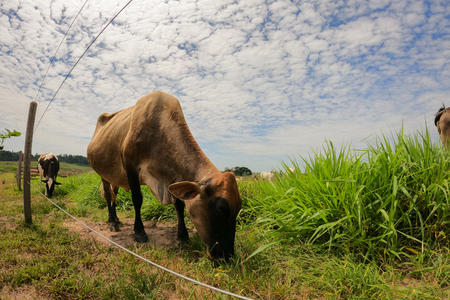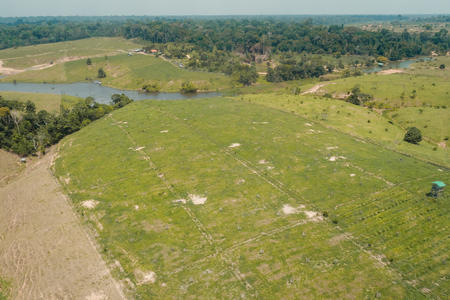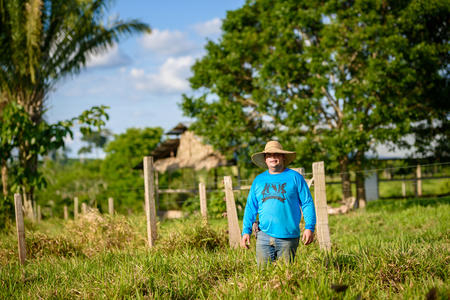- Regenerative livestock farming promotes forest conservation and the family economy in the Peruvian Amazon.
- More than 200 farmers – including men, women and young people – have participated in the
In the last decade, the Peruvian Amazon has been threatened by increased deforestation and forest degradation. This has been caused by illegal logging and unsustainable practices across agriculture and cattle ranching. One of the leading causes is small scale agriculture – particularly cattle farming (). In Peru, methane emissions from livestock account for 35.5% of emissions from the agricultural sector ().
The problem of livestock farming
Livestock farming is one of the main economic sources for local families in the Peruvian Amazon, and critical for regional and national food security. However, it’s a practice that is typically unsustainable and bad for the environment. Not only do livestock generate vast quantities of methane, but they also contribute to land and water degradation, biodiversity loss and deforestation.

An innovative approach
The AGRAP project was developed to tackle this problem. It’s implemented sustainable agriculture and livestock practices to recover and regenerate forests in Madre de Dios – a Peruvian department that is almost entirely Amazon rainforest. Specifically, this includes an ‘agroecological system’, which allows soils to recover without affecting the level of livestock productivity.

“Throughout the project, agroecological practices and techniques were promoted, including the use of forest microorganisms, biofertilisers, natural pesticides and silvopastoral systems. They allow producers to use fewer hectares of forest and natural resources for livestock production – reducing pressure on forests”.
“Throughout the project, agroecological practices and techniques were promoted, including the use of forest microorganisms, biofertilisers, natural pesticides and silvopastoral systems. They allow producers to use fewer hectares of forest and natural resources for livestock production – reducing pressure on forests”.
Focusing on people
The project has also focused on social inclusion – working to remove gender and age barriers to ensure that farming practices work for all members of a family. To deliver this, the project ran an education and training programme: Field Schools for Regenerative Cattle Raising (ECAs, from the Spanish acronym). It was aimed at farmers in the Tambopata and Tahuamanu provinces in Madre de Dios.

“Thanks to this programme, I have been able to see results on my farm. Changing their diet has improved my cattle’s health and we now use fewer resources for our production”.
“Thanks to this programme, I have been able to see results on my farm. Changing their diet has improved my cattle’s health and we now use fewer resources for our production”.
The programme has built technical capacity locally by supporting farmers to understand, implement and sustain silvopastoral systems. These practices intersperse cattle farms with wooded areas to provide a buffer against environmental harm. The wooded areas protect local biodiversity and provide farmers with extra, diversified income from forest products.

“Regenerative farming gave us another vision and the motivation to start a business and fight for our financial independence”.
“Regenerative farming gave us another vision and the motivation to start a business and fight for our financial independence”.
To date, the project has delivered ten field schools in the Madre de Dios region. More than 200 farmers – including men, women and young people – have attended 100 workshops.

“Beyond making this activity more profitable, we are also applying these new practices to take care of my home. We always try to be good with our own space”.
“Beyond making this activity more profitable, we are also applying these new practices to take care of my home. We always try to be good with our own space”.
The process has also been scaled up at the regional level through a Technical Roundtable for Livestock. This provided a space for dialogue between farmer field school leaders, the state government and private sector organisations. They discussed the main problems facing the livestock sector and worked collaboratively to propose solutions. Currently this group is developing a strategic plan which will include a roadmap of concrete actions across the short, medium and long-term.
The project has developed a model which can be replicated in other parts of Peru. It will allow farmers to access new business opportunities and will ensure that the agricultural sector operates and grows sustainably.

“It is important to start today. We need to change livestock farming so that production systems benefit the environment and support food security. Without a field, there is no city”.
“It is important to start today. We need to change livestock farming so that production systems benefit the environment and support food security. Without a field, there is no city”.
The AGRAP project was funded by the , under UK PACT (Partnering for Accelerated Climate Transitions) in Peru.
Climate Group partnered with and the to deliver the project.







